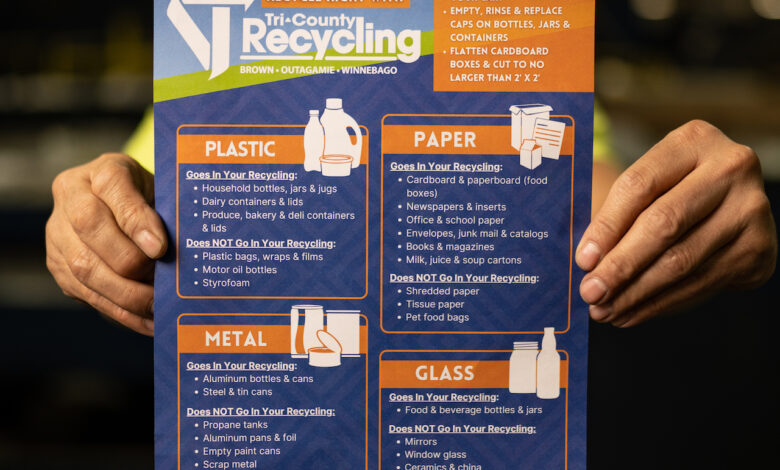Giving back to the earth by recycling right
Tri-County Recycling ‘breaks down’ how to get recycling right for Earth Day

Kira Doman
Editor
With Earth Day this month, recycling is top of mind for most people and the team at Tri-County Recycling has plenty of solid tips for your spring cleaning plans to ensure contamination stays out of your recycling carts.
At Tri County Recycling, staff from Brown County Resource Recovery, Outagamie County Recycling & Solid Waste, and Winnebago County Solid Waste partner to create educational materials that help their residents learn what materials do and do not go in their recycling carts and are quite successful with their social media following, regarding their recycling patterns.
They have garnered quite a large following with their TikTok presence, something Michalikiewicz expressed pride in.
“We started showing people how our operations worked, what contaminates it, what happens after we separate these materials…There was a lot more push on Tik-Tok where people were being more exposed to our impact on the environment when things were shut down, and all of a sudden, waterways were crystal clear, because factories were shut down and people were seeing the grassroots efforts of people actually going in the environment and cleaning up and understood, ‘this is a problem’,” Michalikiewicz said.
Though creating the educational TikToks may be the team’s favorite part of their educational outreach, Tri-County Recycling has many marketing techniques.
Along with a TikTok presence, their social media outreach also includes Instagram, their own website, as well as directly sending businesses their posts. Their primary demographic online is of a younger age. To reach the older generations, they send mailers, postcards, newspaper advertising and promotional materials to property managers. It is quite possible you’ve seen their advertisements on TV or billboards well.
Upon request, Tri-County Recycling will also send information on certain topics, and are even available for lectures and tours for educational purposes.
“So we just try our best to get where people could potentially see our messaging. And then we try to tailor it to our different demographics. So not all marketing is the same, but we do our best to kind of spread the message throughout the different marketing platforms,” Michalikiewicz said.
As we quickly approach Earth Day, the interest in recycling and the carbon footprint of an individual has begun to increase. Schools and businesses want to educate their students and employees on the importance of keeping the environment clean. Michalikiewicz said the Holiday season in December and January is where the action of recycling is at its peak, but April is when the educational aspect dominates.
“We just have a lot more inquiries about what we do here, both at the Tri-County recycling facility and our resource recovery park, which is just Outagamie County, not the other two counties. Interest definitely spikes in April,” she said.
To accommodate this peak in interest, the team at Tri-County Recycling put together a virtual tour of their facility which has been uploaded to YouTube, and serves as a substitute for classes or businesses touring in-person during COVID-19. They include a question-and-answer section with elementary students, where any inquiries expressed by the children will be addressed by the professionals.
With college students and business groups, Michalikiewicz hooks her phone up to a handheld tripod, and walks through the facility for a live walkthrough. Questions can be typed in and responded to at the end of the tour, she said.
“We’re definitely still going to blend that virtual experience with the in person because we have reached far more people in the past two years, doing the virtual route than we’ve ever been able to have in person in our office. So it’s been unique,” Michalikiewicz said.
Many of the questions Tri-County has been receiving include what to do with the influx in waste from COVID-19.
“We’ve gotten a lot of questions about the more pandemic based waste, your to-go cups, your to-go food containers, your Amazon packages, your packaging materials, like styrofoam was a big question and plastic film. so we definitely saw a shift in what they were questioning. And then when we were asked to stay at home at the beginning of the pandemic, we saw a lot of garage cleanouts and basement cleanouts. We didn’t see a big uptick in our recycling input, it stayed relatively the same, but it was mainly a shift from people throwing away waste at schools and offices, to throwing it away at home,” Michalikiewicz said.
One of the bigger challenges in educating the public on recycling habits, is reaching the bigger commercial facilities and multifamily apartment complexes.
“Those businesses and apartments have their own haulers, so sometimes they have their own recycling facilities and their own landfills that they bring their waste to. So their form of outreach is different from our versions of outreach,” Michalikiewicz said. “Even though we may not directly receive the waste from apartment complexes, we still try to do outreach for every resident, regardless if it comes here [Tri County Recycling] or not. So we do see a challenge with businesses and the multifamily complexes but we try to get as much information out to everyone as possible, especially in our three counties so the Browne, Outagamie and Winnebago counties.”
Educational topics the Tri County Recycling team pushes to the public, are to find their local sources that take unacceptable materials at their own facility. Local guidelines in varying counties do not have the same rules, so checking in with their local facilities should always be their first step.
Michalikiewicz explains that they’re enthusiastic to discuss recycling materials and methods with individuals one-on-one if they express interest in a more in-depth way to help the environment.
“We tell them, ‘Hey, see what your community offers. Do they offer a composting program? Do they offer information on how to recycle more effectively in your area, which is also a way to lower your carbon footprint,’” she said.
Michalikiewicz mentioned their “Ugly Eight” contaminants in December, and reminds us of them once more as we near spring cleaning season.
“Our top contaminator still to this day is plastic bags, so even if people just throw them in loosely, we can’t recover them in single stream recycling. They get dirty, they’re gross, we can’t bail them and recycle them,” she said. “This goes for recycling that is stored inside plastic bags as well. All of those bottles and cans are so tangled in the plastic bags that they cannot be recycled,” Michalikiewicz explained. “If you’re recycling plastic bags, with our equipment they still get torn up, they get wrapped around our equipment. It uses a lot of unnecessary maintenance time and our crew has to actually climb into the machines twice every shift to cut through the plastic bags.”
She went on to explain more on the Ugly Eight regarding tanglers.
“Another one of our Ugly Eight materials is our tanglers,” Michalikiewicz said. This includes things like extension cords, tarps, blankets, and especially now, garden hoses. These are called “tanglers” because of the way they tangle around the equipment just like the plastic bags, which causes major damage. As people clean out their garages in preparation for spring, the importance of being aware of what is and what is not recyclable is keen.
Not only for the environment, but for the safety of employees as well. People may see them as familiar and funny characters from TikTok, but their role as employees comes first.
One of the more dangerous wrongly recycled items are batteries, said Michalikiewicz.
“They are really hazardous to our equipment because if those batteries split open, they generate a lot of heat and they start materials on fire. Since I’ve been here I’ve seen three lithium ion battery fires, (which are) very dangerous and really hard to put out. So that’s anything in a cell phone, a lot of electronic devices, people throw in their car batteries sometimes, so just very dangerous stuff,” she said.
Fire danger is not even the least of their safety concerns. Staff sometimes injure themselves on sharp objects like loose needles and syringes.
“We have it all broken down, but it’s a lot of hazardous material,” Michalikiewicz said.
To aid in learning which materials are recyclable or not, Michalikiewicz proudly describes the “Waste Wizard” on their website.
The “Waste Wizard” is a search tool on the Tri County Recycling Website that can be used to check where and how something can be recycled.
“Residents can type in anything like motor oil and plastic water bottles and yard waste; and they’ll be directed to where they can bring those materials,” Michalikiewicz said. “If you live in Brown County, you can use our Tri County recycling website and you can find out where to bring your stuff in Brown County.”
Michalikiewicz said people are frequently bringing in items that cannot be recycled at their facility because they don’t know what can and cannot be recycled. With the “Waste Wizard” tool, that can be eliminated.
“So for those harder to find materials, people can go on there and figure out where to properly bring them so we can process them accordingly,” Michalikiewicz said, “So we want to highlight those materials and show people, ‘use this tool, figure out where it goes,’ because we can only process what we can realistically sell back into the market.”
Still, she said, recycling can be daunting for anyone, but it doesn’t have to be.
“I think what deflates me most is when you still see the contamination as high as it is, like what we have to pull out of the stream before we run it through our system. I’m like, ‘Okay, so we’ve gone viral four times now, and there’s still plastic bags and they’re still batteries and all this stuff,” she said. “It’s like where are we missing it?’ So I’d say my biggest frustration is just the fact that you can’t really tell your impact sometimes, especially when it comes to outreach. Like we get the message while we’re here, but you can’t hit everyone.” Michalikiewicz said.
Because Michalikiewicz has so many duties with her position at Tri-County Recycling, she remarks that she can see the weight of what’s recycled. The items they’re manufacturing compared to the items collected makes the impact of what Tri-County Recycling is doing for the community much more noticeable, and her doubts are then replaced with pride.
“We in the Tri-County partnership, between Brown, Outagamie and Winnebago, have saved millions of dollars for the residents by sharing in that responsibility to have a central recycling facility, and to have the landfill so close too, so just knowing that our impact and what we are keeping out of the landfill and getting back into the market is easily the best part of this position,” she said.
And recycling right will have its own impact over time as well.
For more information on recycling visit Tri-County’s website.




